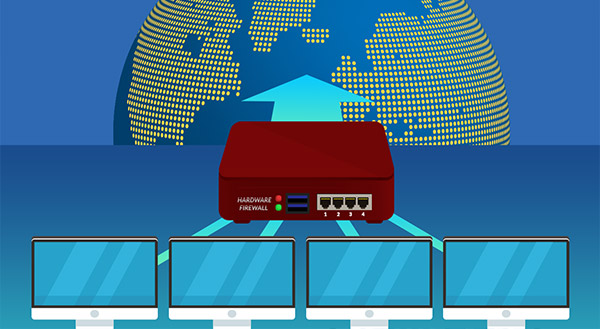A firewall sounds like a pretty intense thing – unless you’re an action-movie stuntman. Yet when it comes to internet security, you may not have as much firewall protection as you need.
Many internet security products bundle antivirus and firewall software, and many users think this is enough. But first, let’s be clear about what a software firewall actually does:
- It regulates data through port numbers and applications.
- It allows you to block incoming traffic from certain locations.
- It distinguishes between computer programs allowing data to one program while blocking another.
- It blocks traffic attempting to leave a device to access other devices on your network.
There are drawbacks, though. Software firewalls work only on the computers on which they are installed, and you’ll need to buy multiple licenses to protect several computers.
You also need expertise to administer the firewall to keep up with changing threats. And there are security threats. Bad actors target software firewalls. They’re right there on the computer they seek to exploit.
Beefing Up Your Firewalls
Many businesses also use hardware firewalls to add security. A hardware firewall around your office network acts as a perimeter boundary. The hardware firewall is like the border guard keeping an eye out for dangerous traffic. The firewall inspects incoming internet traffic to protect you from malware and cyberthreats.
IT experts can set up firewalls to pass only safe data. This adds a layer of protection to your network and also secures network-connected devices. Workstations, printers, digital equipment, and telephone systems often don’t have software firewalls.
So, combining firewalls protects both local computers and other devices on your network. The hardware firewall checks traffic coming in from and going out to the internet, whereas the software firewall secures what’s coming into or out of the computer, even from internet sources.
Think about it this way: A cybercriminal is trying to access your systems. They take many approaches, one of which is trying to breach your network perimeter. Another is sending targeted communications to sucker someone into clicking on a virus-laden email. The hardware firewall could stop the perimeter attack, but the software helps stop the malware infection spreading from the user’s computer to others in your office.
Partner with a Firewall Expert
Firewalls can give your business tremendous control over:
- how users connect to the internet;
- what information is retrieved from the internet;
- whether files can leave the company over the network;
- what devices are accessible and from where.
Yet both software and hardware firewalls need the right expertise to install correctly. Firewalls must be regularly monitored and managed, because threats are constantly changing.
Combining firewalls adds protection but only if you configure them to minimize weaknesses. You’ll need someone to identify compatibility issues and avoid blocking legitimate data.
Partner with an IT expert. We know how to work with firewall rules, and understand what they mean and how to react to alerts generated. Have you heard of a breach that compromised Target’s point of sale systems? That fiasco involved ignored firewall alerts! Don’t let it happen to you.
We can help you set up and maintain the firewall protection you need. Contact us today 281-777-9265!

